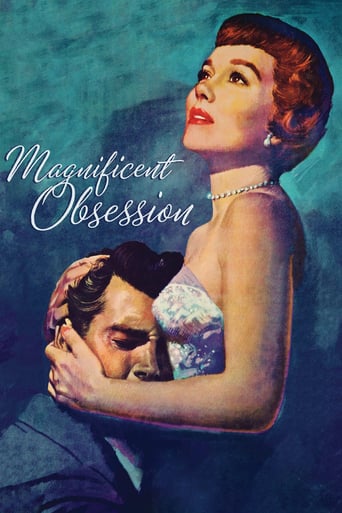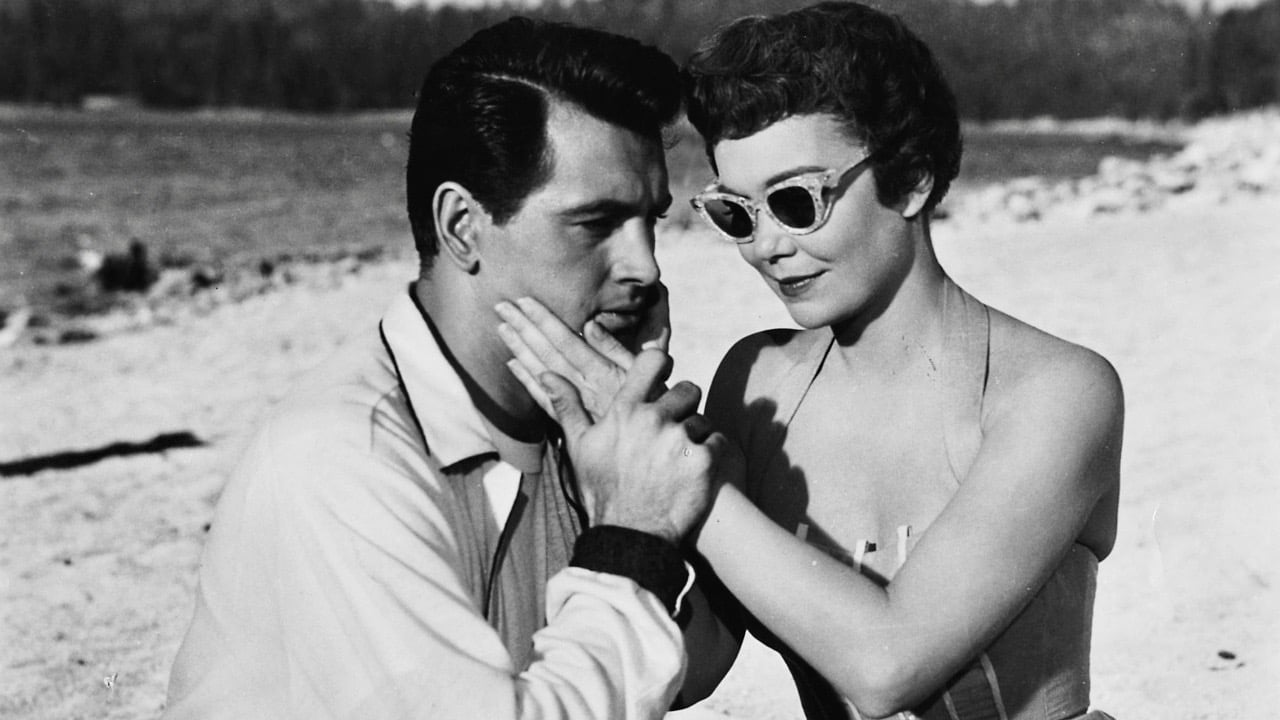daniel_white-40631
I did something really insane last night: I took out of the local library The Criterion Collection of "Magnificent Obsession" thinking I was only getting the 1954 remake. However when I got home I discovered I had both versions, Jane Wyman's and Irene Dunne's 1935 original. Now this is where I ought to have my head examined because I decided to watch both movies one right after the other! I am still reeling. Here's the plot: Helen is married to a doctor who dies because medical equipment that could have saved him was unavailable because it was being used to resuscitate selfish playboy Bob Merrick. When Bob tries to make it up to Helen he inadvertently causes her to have an accident which blinds her! Hopelessly in love with our sightless heroine Bob decides to go to medical school to become a surgeon so he can perform the operation that will restore her sight! I am not making any of this nonsense up. Though I love Irene Dunne the Jane Wyman remake is the better of the two films not so much for Jane (Hollywood's dullest leading lady) but for Douglas Sirk's lush direction and an over the top musical score. Plus you get to see a gorgeous Rock Hudson naked from the waist up! This is sheer movie lunacy but if you must watch do yourself a favor and only view one of them at a time! Otherwise you risk losing your mind. I almost lost mine!
disinterested_spectator
There is a spiritual premise underlying this movie. Ultimately, it is Christian in nature. We know this in part because Edward Randolph refers to Jesus at one point in the movie, and in part because it is based on a book by Lloyd C. Douglas, who was a devout Christian. But it is more than that, because whereas everyone knows about Christianity, the particular spiritual principle in this movie seems to be known only to a few, as if there were a secret society. Why it is a secret is not explained, which is hard to understand, because if more people knew about it and applied that knowledge, the world would be a much better place.The secret principle is karmic in nature, and is explained by analogy with electricity. The way it works is that if you do good things for people without letting other people know about it, and you refuse any attempt on their part to repay the debt, you build up a spiritual charge of good karma that rewards you. If you allow them to repay the debt, the spiritual force is discharged. Most people are grounded, never accumulating a charge, because they allow people to return the favor. If you tell other people about your kindness or charity, the spiritual force will dissipate, as with a wire without insulation. This need to keep one's good deeds a secret is to be distinguished from the secrecy surrounding the principle itself. Even if you accept the former, that still does not explain the latter.The story begins when the reckless behavior of the rich, irresponsible playboy Bob Merrick inadvertently causes the death of Dr. Wayne Phillips, who we later find out was the one who initiated Randolph into the secret spiritual principle. Dr. Phillips was such a good man that he used up all his income and borrowed against all his assets to do good deeds, leaving his wife, Helen, and his daughter, Joyce, nothing. Merrick tries to make amends, but Helen is insulted by his efforts to use mere money to atone for the death of her husband. Later, Merrick learns about the karmic principle from Randolph, but he is a bit crude in his attempt to put it to good use. He helps someone out who needs money, and then, figuring he is all charged up with a lot of good karma, tries to make a dinner date with Helen, whom he now has the hots for, even though she is a widow of only a few weeks. In trying to get away from his persistent advances, she is struck by an automobile and blinded. Thoroughly chastened, Merrick decides to go back to medical school, becomes a doctor, and then has to perform an emergency operation on Helen, which saves her life and restores her vision, allowing them to marry and live happily ever after.If the spiritual metaphysics of this movie is just too incredible to suspend disbelief, it becomes an outrageous melodrama of coincidence. Furthermore, we are appalled that Dr. Phillips did not provide for his wife and daughter in the event of his death. We get the sense of a man who was so caught up in the idea of helping strangers that he neglected his family. But given what he believed in, I guess he figured his spiritual estate would take care of them, on the assumption that good karma can be inherited.In any event, even an atheist can understand that helping out one's fellow man can be rewarding, that one is paid back, in a way, for one's kindness and charity. And thus, the movie can be accepted allegorically and enjoyed as a good tearjerker.
wes-connors
Handsomely reckless sportsman Rock Hudson (as Robert "Bob" Merrick) crashes his speedboat and survives, miraculously unscratched. However, Mr. Hudson's medical treatment inadvertently contributes to the death of a beloved doctor. It doesn't seem fair that a hero (Dr. Phillips) dies while a heel (Mr. Hudson) is saved. The good doctor's widow Jane Wyman (as Helen) becomes acquainted with Hudson and rejects his amorous advances. Hudson decides to change his ways by secretly doing good deeds. Despite his handsomeness and wealth, Ms. Wyman continues to spurn Hudson. His "Magnificent Obsession" with Wyman leads Hudson to make another tragic event occur, but love could eventually conquer all...Producer Ross Hunter delivered the goods and director Douglas Sirk turned some silly soap operas into high cinematic art. With this one, Mr. Sirk is very much like a painter, brushing light and shadows across the screen. Watching the movement of characters and cameras will reveal additional brush strokes. The characters are always doing something. Nobody has to just stand there and say their lines, which is nice for those on both sides of the screen. It's all so smooth, even when Hudson drunkenly holds up the "DANGER" sign for the wide screen camera before bonding with philosophical pipe-holder Otto Kruger (as Edward "Ed" Randolph). And, it's pleasingly ludicrous, although the final quarter is a bit less artful.******** Magnificent Obsession (4/20/54) Douglas Sirk ~ Jane Wyman, Rock Hudson, Barbara Rush, Agnes Moorehead
mark.waltz
Because now we've got Technicolor, Widescreen, Ross Hunter, Douglas Sirk, and more importantly, Rock Hudson. He takes on the practically impossible task of playing this sinner-to-saint transformation, and almost makes it work, if not totally. Jane Wyman lacks the youthful effervescence of Irene Dunne from the original, but gives a beautifully restrained performance nonetheless. Otto Kruger expands on Ralph Morgan's role of the artist (here a painter instead of a sculptor) who expresses the film's moral.This being a soap opera like premise, it is more than appropriate that the film focuses on two "Guiding Light's", Kruger and the compassionate nurse, played her by Agnes Moorehead who fortunately gets to be somewhat tough in her duties, yet kindly compassionate under that Endora red hair of hers. Barbara Rush adds some more layers to the sweetness of her stepdaughter character.Hudson and Wyman at first seem an odd couple to be paired with in a spiritual secret storm mean to give the matinée ladies a good cry away from the daily viewings of "Love of Life" and "Search For Tomorrow", and the film rises above the stories clichés. Made on the success of another film version of a Lloyd C. Douglas novel ("The Robe"), this takes the life lesson of being kind and helpful to strangers without expecting anything back in return to a modern level. It utilizes beautiful locations and a lush musical score to flesh out its already melodramatic tale. In an era of exotic beauties like Monroe, Taylor, Loren and Lollobrigida (or down home girls like Doris Day), Wyman's box-office success with this is a nice reflection on the 1950's environment where a box in a living room was sometimes keeping people from going to the movies, except, like in the case of this movie, when they really had something worth going to.


 AD
AD




